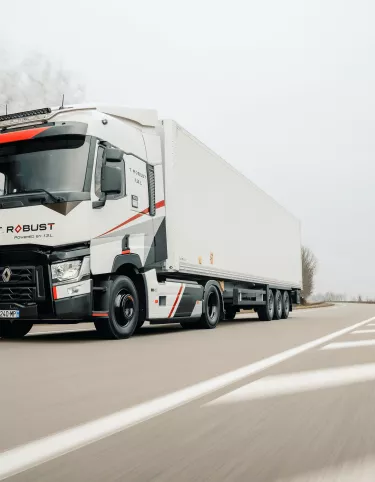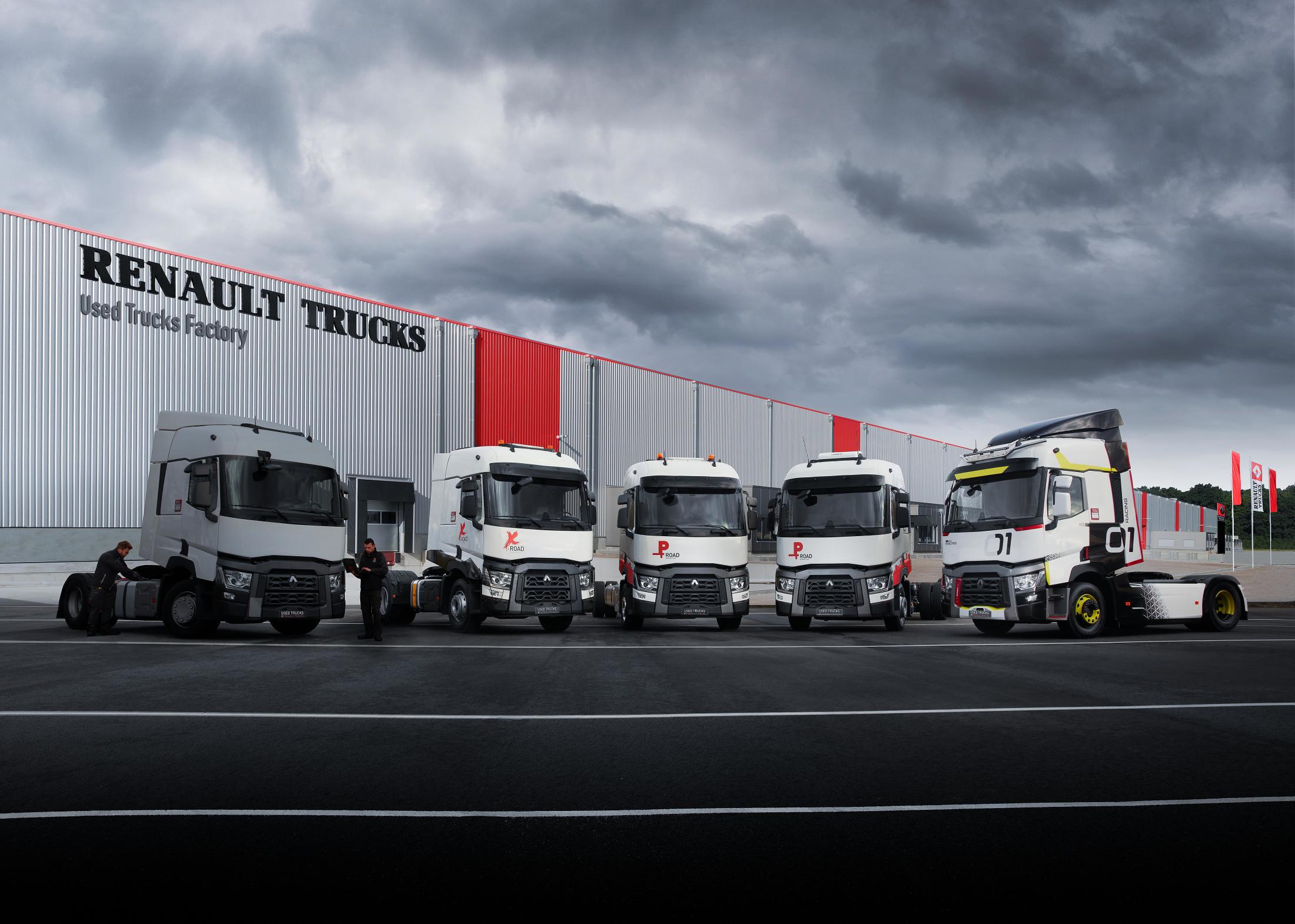مرحبًا بكم في موقع Renault Trucks الجزائر
Transport solution
Circular economy by Renault Trucks
مايو. 10 2022

The growing awareness of sustainability and material sourcing is prompting all businesses to review their own practices, and that of their suppliers. At Renault Trucks, we are committed to a sustainable transport of goods, and have rethought the entire life cycle of our trucks with the aim of life and reducing obsolescence. This move has resulted in an overhauled used vehicle and spare parts offer, thanks to the use of reconditioned parts. This is one of the many actions in our approach to attaining decarbonised transport.
Principles of circular economy
Regardless of the sector, a circular economy is based around a simple philosophy: act to ensure that every product used in production is a resource. This entails not only managing waste better, but limiting and even eliminating it altogether. A circular economy is based around a virtuous loop: reuse anything that can be used, during its initial use or after conversion. Unusable components are returned, reprocessed to the maximum.
Three main axes govern how it works:
-
Eco-design: this involves the entire life cycle, from the design stage of goods, processes or services, minimising their impact and making provision for the recycling of any resulting waste;
-
Changing consumer behaviour: by extending the period of use and promoting more responsible consumption;
-
Waste management and recycling.
As part of our full commitment to the development of a sustainable and decarbonised transport, Renault Trucks has rethought the life cycle of our commercial vehicles applying a circular logic.
The three pillars of circular economy at Renault Trucks
Each new truck designed at Renault Trucks takes the finest details regarding its end-of-life and the options for recycling its component parts into consideration.
Regenerate, Repurpose and Return are the three pillars of our vision for a circular economy.

Regenerating our trucks to extend their life
By regenerating, we intend to extend the truck’s life by updating the software and renewing parts, while preserving the profitability as well as the planet limited resources.
When a truck reaches the end of its first or second life with a customer, it is returned to our network. It is processed to be recovered and "regenerated", undergoing a strict 200-point inspection. The inspection is based on technical points (driveline, emissions control system...) and safety components (braking, suspension, lighting and more). Everything is validated through a road test. Finally, any components requiring replacement are replaced and the on-board software is updated to the most recent available version. The truck is fully reconditioned and returned to an almost as-new condition, and is given a SELECTION label and a Renault Trucks-certified warranty.

Repurposing used trucks at the Used Trucks Factory: a production facility that gives new life to commercial vehicles
The Used Trucks Factory is located in Bourg-en-Bresse, France. It strives to attain a similar objective: to prolong the life of products. It offers truck conversions or full transformations to adapt them to market or customer demands. Examples include retrofitting a B100 biodiesel truck to run on 100% biodiesel.

The Used Trucks Factory also performs more radical conversions to extend the life of vehicles, by adapting them to other applications or industries: this is especially common for the Renault Trucks T X-Road, T P-Road, T X64 and T42, T62 or T X-Port trucks. Both for the European Market and internationally, the teams recondition used vehicles to supply custom vehicles for the long haul, site delivery and distribution sectors. For example, vehicles that were intended for the French market may be reinforced and adapted for use in Africa or the Middle-East. A road tractor unit may also be converted into a rigid Renault Trucks P-Road.
The transformation operations are conducted at the Used Trucks Factory in accordance with an industrial manufacturing and quality control process of comparable stringency to that applied in the production of a new vehicle. This extends the life of a truck or allows its components to be reused, thus limiting environmental impact.
Return rather than replace: REMAN
With Renault Trucks you can benefit from a standard exchange service. When a truck component reaches the end of its life, whether it is defective or damaged, you can opt for a reconditioned equivalent part with warranty rather than purchasing a new replacement part. The parts reconditioning process is carried out at our Renault Trucks production facility located in France.
Upon arrival, parts are dismantled completely and each component is inspected by dedicated teams. Irreparable components are returned, others are cleaned and reconditioned to be reused. The validation process and technical specifications for these operations and parts are compliant with the most stringent reliability, safety and environmental standards. Industrial reconditioning and bench-tested specifications mean that the original performances of the truck are retained. Newly reconditioned parts are subjected to the same quality testing as new parts. Once validated, the parts can be fitted on the truck for it to start its second life. Standard exchange parts provide the same performance as OEM parts and have the same international 2-year warranty. More than 2,000 parts are available, covering all systems: engine and gearbox parts and major components, braking systems, clutches, alternators, starter motors, electric and electronic systems, steering and suspension, cooling, etc.
The benefits are two-fold:
-
It is primarily financial, because you have a part that is of the same quality as a new part, but at a lower cost.
-
It is also environmentally friendly.
What could be better than signing up to a sustainable development process, while saving money? Production of reconditioned parts has 60% less environmental impact than that of new parts! It encourages more responsible consumption, prolongs the period of use of your vehicles and their parts whilst limiting waste production.
Recycling is also applicable to the lithium-ion batteries fitted to the electric vehicles that we sell. These can be reused in another sector, such as assisting with wind turbine operation, or they can be returned.
Our trucks are 95% recyclable and 98% recoverable in accordance with the ISO 22628 standard. Each part is marked to make it simpler to direct it to the relevant recycling facility. Parts covered by the European REACH legislation pertaining to the manufacturing and use of chemical substances are systematically logged and flagged to the appropriate bodies.
It is through this global process and the numerous practical measures taken to put plans into action, that we have emerged as pioneers in our circular approach to offering commercial vehicles, and secured our position as leader in the transition to a sustainable transport. Please do not hesitate to contact our experts for assistance with our own energy transition journey.